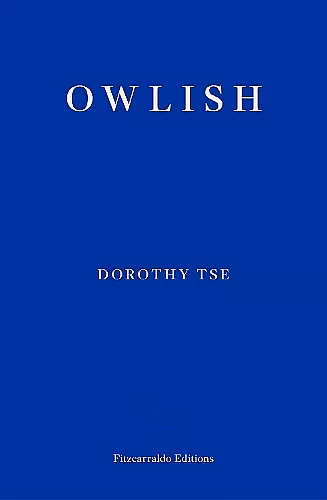Owlish
Dorothy Tse author Natascha Bruce translator
Format:Paperback
Publisher:Fitzcarraldo Editions
Published:23rd Feb '23
Should be back in stock very soon

In the mountainous city of Nevers, there lives a professor of literature called Q. He has a dull marriage and a lacklustre career, but also a scrumptious collection of antique dolls locked away in his cupboard. And soon Q lands his crowning acquisition: a music box ballerina named Aliss who tantalizingly springs to life. Guided by his mysterious friend Owlish and inspired by an inexplicably familiar painting, Q embarks on an all-consuming love affair with Aliss, oblivious to the sinister forces encroaching on his city and the protests spreading across the university that have left his classrooms all but empty. Thrumming with secrets and shape-shifting geographies, Dorothy Tse’s extraordinary debut novel is a boldly inventive exploration of life under repressive conditions.
‘[A] surreal fantasy and the reading experience is demanding ... you might ask yourself if it's worth the effort. On reaching the end you will surely conclude that it is...a very brave book.’
— David Mills, The Times
‘It’s tempting to call Owlish a fantasy, or an anti-fairytale. The book is not shy of drawing in references, including to Mephistopheles, Kant, the Brothers Grimm, Lewis Carroll, Kafka, Orwell and Tchaikovsky’s Swan Lake. However, Tse’s acerbic, freewheeling spirit is generically flirtatious, rather than genre-bound. She steals from the western canon with chutzpah and panache to create a subversive tale about perilous desire, high-rise bureaucracy and sophisticated corruption in a defenceless city under siege… Owlish wittily captures a recent crisis moment in Hong Kong, exploring a discombobulating state caught between civilization and its discontents.’
—Kit Fan, Guardian
‘In Owlish, nimbly translated by Natascha Bruce, there are several nods to Franz Kafka and Tse offers a powerful vision of government repression.... Tse combines the banal and the fantastic to terrific effect. Full of striking imagery, Owlish is a vertiginous tale of a people sleepwalking into catastrophe.’
— Lucy Popescu, Financial Times
‘Beguilingly eerie, richly textured, the pages of Owlish are drenched in strange beauty and menace. Like all the best fairy tales, it reveals the dark truths that we would rather not look at directly, and does so with a surreal and singular clarity.’
— Sophie Mackintosh, author of Cursed Bread
‘Dorothy Tse is a magnificent historian of unreal places. Her sage and serious characters are cast adrift in realities that are neither sage nor serious at all – and possibly impossible. Her parallel worlds and paradoxes brilliantly illuminate our own reality, with all its fictions masquerading as facts (and vice versa). Boundlessly creative, richly philosophical – I loved this book.’
— Joanna Kavenna, author of Zed
‘A magical and potent tale for these tyrannical times.’
— NoViolet Bulawayo, author of Glory
‘Tse joins the ranks of artists currently remaking the world, from Yoko Tawada to César Aira.’
— Joyelle McSweeney, author of Toxicon and Arachne
‘Owlish is so delightfully creepy, wonderful and strange.’
— Camilla Grudova, author of Children of Paradise
‘A bold, brilliantly absorbing read. This clever, mercurial portrait of an alternate Hong Kong lingers long after the last page.’
— Irenosen Okojie, author of Nudibranch
‘Owlish [is] a darkly sexual sociopolitical fable…Tse’s excellent novel becomes increasingly bizarre.’
— Hal Jensen, TLS
‘Owlish is the story of a city as much as it is the story of Q. Between his correspondence with a strange figure known only as Owlish and a ballerina figurine who has come to life, the professor is immersed and distracted enough not to notice the city and his university emptying out around him as the political situation deteriorates and falls into chaos. Tse’s style in Owlish, with its magical elements, suggests a more overtly political Italo Calvino, or Salman Rushdie with a lighter touch…the story is engrossing and the prose, translated by the always satisfying Natascha Bruce, a delight.’
— Jessa Crispin, Telegraph
‘Owlish … has been translated into a playful and sinuous English by Natascha Bruce… the book, with its ellipses and obstructed messages, were depicting the reality-warping effects of an uncanny, constraining force—a force like state censorship.’
— Katy Waldman, New Yorker
‘[A] brilliantly unsettling fairytale.’
— Katie Goh, i-D
‘In Owlish Tse makes a compelling spectacle; demonstrating the price of apathy during oppressive administrations, suggesting how we might resist the unspeakable mechanisms of regime. She crafts a wondrous hinterland in her writing, imagining the waiting worlds we might dream ourselves into – if we try.’
— Annie Hayter, BIG ISSUE
‘Owlish bears witness to a dream state, to a place where language doesn’t always work quite how it should, where the boundaries of deviance, obedience, and desire blur. Caught within these shades of reality, the automata whirs. A cranking becomes faintly audible. Tse weaves a kind of visceral, bodily syntax full of openings and shrouded things; tantalising always, whether for us or for our hero.’
— Marguerite Carson, The Skinny
‘In short, glimmering chapters, Owlish; nimbly translated by Natascha Bruce, reveals how the loss of freedom divides people from one another and from themselves. Tse’s novel is playful, poetic and devastating – a reminder that surrealist writing is not unreal, but the most real way of depicting the nightmare of living under tyranny.’
— Irina Dumitrescu, Times Literary Supplement
ISBN: 9781804270349
Dimensions: unknown
Weight: unknown
224 pages